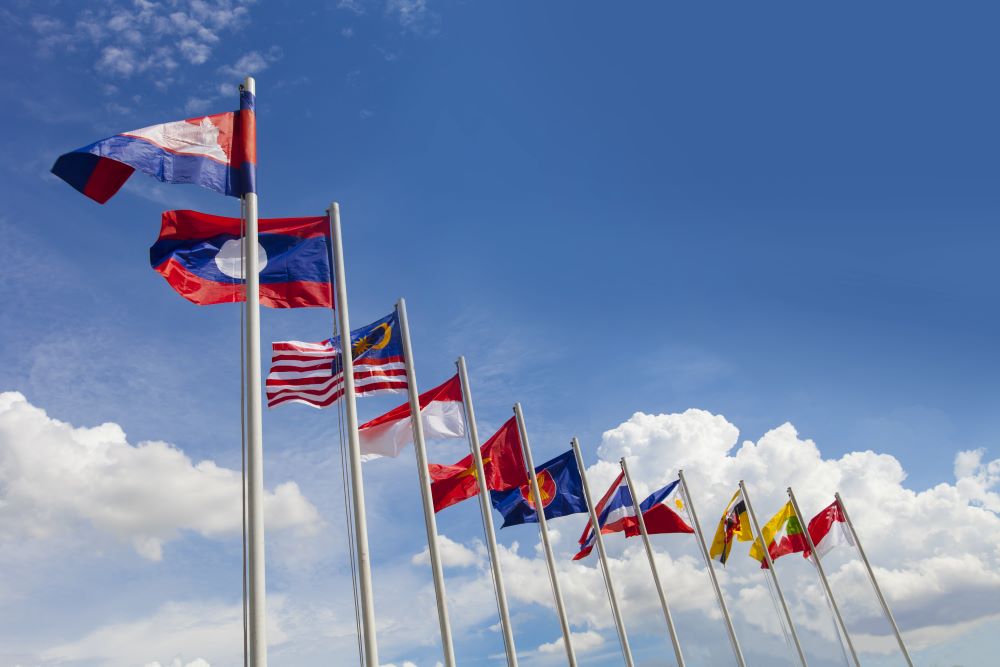
Home to some of the world’s fastest-growing economies and increasingly populous nations, the Association of Southeast Asian Nations (ASEAN) is a bloc on the ascent.
A post-pandemic supply chain reshuffle presents great opportunities for its 10 nations. Many are jostling to attract foreign firms fleeing China, while enhancing relations with the flailing Asian superpower.
The UK is also eager to strengthen its ties to the region, with parliamentary support for future trade deals and diplomatic cooperation.
China void
As the US and EU strategically distance themselves from China, so Thailand and Vietnam have moved quickly to fill the manufacturing vacuum left behind.
They represent attractive manufacturing sites to firms spooked by supply chain disruption stemming from China’s zero covid policy.
For Vietnam this is underpinned by stronger trade relations with Europe since the ratification of the EU-Vietnam Free Trade Agreement (FTA) in 2018.
In 2021, the value of bilateral EU-Vietnam trade stood at over €49bn, a figure that has risen steadily for the past decade. With €39bn comprised of Vietnamese exports, the balance of trade is substantially in its favour.
Thailand also increased its exports to the US and EU over the past year, by 20.5% and 30.2% respectively. In 2021 bilateral trade between the EU and Thailand totalled €35.4bn.
As previously reported in the IOE&IT Daily Update, both countries rose in the Economist Intelligence Unit’s Business Environment Ranking this year. While not a predictor of foreign investment trends, the list has been strongly correlated with them in the past, a sign of further good things to come.
China looks to ASEAN
The twentieth annual China-ASEAN expo is due to begin in Nanning on 16 September. Forty countries will participate in the three-day trade fair, expected to attract over 1,700 firms.
The fair could be a much-needed boost for China, amid the retreat of other trading partners.
Ties between the two regions have tightened since the pandemic, as ASEAN became China’s top trading partner in 2022.
This is testament to the success of the Regional Comprehensive Economic Partnership (RCEP), signed in 2020. RCEP created an Asia-Pacific free-trade bloc, comprising the 10 ASEAN nations, plus China, Japan, South Korea, New Zealand and Australia.
Accounting for 29% of the world’s GDP and a third of the world’s population, the deal makes RCEP the world’s largest trading bloc.
Reuters reports that China is aiming to sign an updated, third version of its FTA with ASEAN, and is pushing for full implementation of RCEP terms.
UK perspective
Hamish Mackay, trade and customs specialist at the Institute of Export and International Trade (IOE&IT), has worked in ASEAN markets throughout a successful career in aerospace and defence. Reflecting on the appeal of China as a trade and manufacturing hub, he said:
“We don't want to stop doing business with China because it's a huge economy. And, until recently, the fastest growing economy in the world."
But he noted growing Chinese security concerns experienced by many UK businesses and the opportunities ASEAN presents. He added:
“In international trade, you need to know who you're dealing with – transparency is key. Trade can be quite scary because so many companies think they can start doing business with just about anyone, without realising they’re not necessarily the best people. If you don't carry out due diligence, you can get caught out.
“We need to start improving our trade relations with some of the countries that we’ve just not been trading with.
“I think we should be pursuing further trade deals, especially in emerging East Asian nations. Many were pretty strong already, and now they've managed to get out from underneath China and carve their own niche, that will only continue. I think it would be fantastic for us to work with them.”
Parliamentary committee
Mackay’s sentiment was echoed in a recent report by the Foreign Affairs Committee, which advocated greater engagement with ASEAN across trade and investment.
This included signing Free Trade Agreements with Vietnam and Singapore, and strengthening partnerships with Thailand, Malaysia, the Philippines and Vietnam across other areas, such as climate and security.
The report also voiced concerns about China’s security risk and increased aggression in the South China Sea, encouraging the UK government to take a tougher stance as Foreign Secretary James Cleverly headed to Beijing for “constructive” talks.
Indonesian focus?
The parliamentary report encouraged the UK to make Indonesia the site of significant diplomatic and economic focus.
The world’s largest island nation is home to a growing market of 300 million people and is exploring trade agreements outside ASEAN.
It reignited stalled trade talks with Peru earlier this month (22 August). The Indonesia-Peru Comprehensive Economic Partnership Agreement (IP-CEPA), first discussed in 2017, would cement trade and investment commitments between the two countries.
Bilateral trade was worth $554m in 2022, with Indonesia enjoying a trade surplus as exports totalled $442m. This mostly comprised vehicles, animal and vegetable products, and footwear.
Global approach
The Peru talks mark a continuation of Indonesia’s campaign to expand globally, building trade networks beyond the ASEAN bloc and seeking further foreign investment.
Under president Joko Widodo, first elected in 2014, Indonesia has created 19 special economic zones designed to attract $50bn of investment by 2030. Widodo intends to capitalise on the China void, liberalising labour laws and slashing Indonesia’s high rate of corporate tax to appeal to multinational firms.
Indonesia has also strengthened ties with the Middle East, signing a preferential trade agreement (PTA) with Iran this year, and an FTA with the UAE in 2021. Both deals will reduce tariffs on oil imports and facilitate frictionless sales of its biggest export: palm oil.
Plans to pursue further opportunities in South America, as well as in Africa, contrast with strained EU relations. The EU expressed dismay at Indonesia’s plans to reduce raw material exports, such as nickel, while Indonesia criticised EU regulations limiting imports of products sourced from deforested land. These tariffs would severely impact several Indonesian exports, such as coffee, rubber, paper and palm oil.
